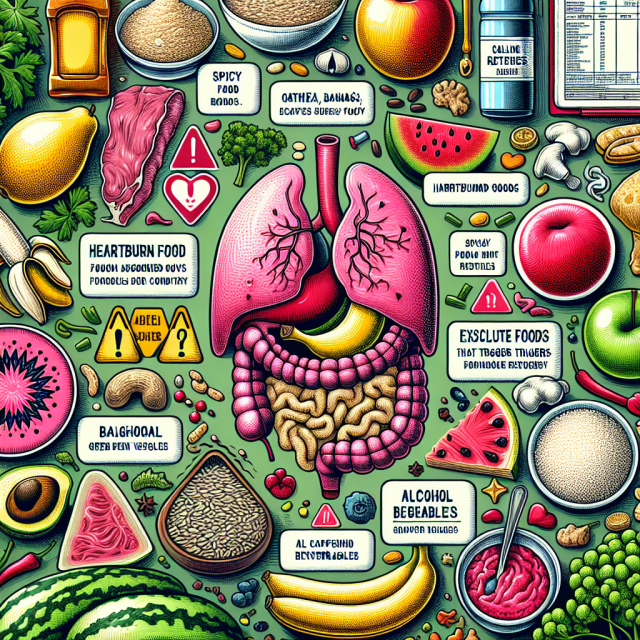
Acid reflux, often experienced as heartburn, is a common condition that affects millions of people worldwide. It occurs when stomach acid flows back into the esophagus, causing discomfort and a burning sensation. While occasional heartburn is not usually a cause for concern, chronic acid reflux can lead to more serious health issues. One of the most effective ways to manage acid reflux is through dietary changes. This article explores the best diet for acid reflux, highlighting foods to eat and those to avoid for heartburn relief.
Understanding Acid Reflux and Heartburn Basics
Acid reflux, medically known as gastroesophageal reflux disease (GERD), occurs when the lower esophageal sphincter (LES) weakens or relaxes inappropriately, allowing stomach acid to flow back into the esophagus. This backwash of acid can irritate the lining of the esophagus, leading to the uncomfortable sensation known as heartburn. Symptoms often include a burning pain in the chest, regurgitation of food or sour liquid, and difficulty swallowing.
Various factors contribute to the development of acid reflux, including obesity, smoking, pregnancy, and certain dietary habits. Eating large meals, lying down shortly after eating, and consuming trigger foods can exacerbate the condition. While medications can help manage the symptoms, lifestyle modifications, particularly dietary changes, play a crucial role in reducing the frequency and severity of acid reflux episodes.
Understanding the triggers and symptoms of acid reflux is essential for effective management. By identifying foods and habits that contribute to heartburn, individuals can take proactive steps to mitigate their symptoms. This often involves a combination of avoiding certain foods and embracing a diet rich in foods that promote digestive health.
Key Foods to Include for Acid Reflux Relief
Incorporating certain foods into your diet can help manage acid reflux and provide relief from heartburn. High-fiber foods, such as oatmeal, brown rice, and whole-grain bread, are excellent choices as they help absorb stomach acid and reduce symptoms. These foods also promote a feeling of fullness, preventing overeating, a common trigger for acid reflux.
Fruits and vegetables are another essential component of an acid reflux-friendly diet. Non-citrus fruits like bananas, apples, and pears are generally well-tolerated and can help neutralize stomach acid. Leafy greens, broccoli, and cucumbers are also beneficial due to their low acid content and high nutritional value, aiding in digestive health and reducing inflammation.
Lean proteins, such as chicken, turkey, and fish, are preferable over fatty meats, as they are less likely to trigger heartburn. Incorporating plant-based proteins, such as lentils, chickpeas, and tofu, can also be advantageous. Additionally, consuming healthy fats, like those found in avocados, nuts, and olive oil, in moderation can support overall digestive health without aggravating acid reflux symptoms.
Foods to Steer Clear of for Heartburn Management
To effectively manage acid reflux, it is essential to avoid foods and beverages that are known to trigger heartburn. Spicy foods, such as hot peppers and curry, can irritate the esophagus and should be consumed with caution. Similarly, acidic foods like citrus fruits, tomatoes, and vinegar-based products can exacerbate symptoms and are best limited or avoided.
High-fat foods, including fried items, full-fat dairy products, and fatty cuts of meat, can relax the LES, allowing stomach acid to escape into the esophagus. It is advisable to opt for low-fat alternatives and cooking methods like grilling, baking, or steaming to minimize heartburn risk. Additionally, chocolate, caffeine, and carbonated beverages can contribute to acid reflux and should be consumed in moderation or avoided altogether.
Alcohol is another common trigger for acid reflux, as it can weaken the LES and increase stomach acid production. Reducing alcohol consumption or eliminating it altogether can significantly improve symptoms. Keeping a food diary to track which foods trigger your heartburn can be helpful in identifying and eliminating personal triggers from your diet.
Crafting a Balanced Diet for Long-Term Relief
Creating a balanced diet tailored to alleviate acid reflux involves more than just choosing the right foods; it also requires mindful eating habits. Eating smaller, more frequent meals can prevent the stomach from becoming overly full, reducing the likelihood of acid reflux. Taking time to chew food thoroughly and eat slowly can also aid in digestion and decrease the chances of heartburn.
Staying hydrated is crucial for digestive health, but it is important to drink fluids between meals rather than during them to avoid overfilling the stomach. Herbal teas, like chamomile and ginger tea, can be soothing and may help alleviate symptoms. Avoiding late-night meals and allowing at least three hours between eating and lying down can also help prevent nighttime acid reflux episodes.
Incorporating lifestyle changes alongside dietary adjustments can further enhance long-term relief from acid reflux. Maintaining a healthy weight, avoiding smoking, and elevating the head of the bed can all contribute to reducing symptoms. By adopting a balanced diet and making conscious lifestyle choices, individuals can effectively manage acid reflux and enjoy a better quality of life.
Managing acid reflux through dietary changes is a practical and effective approach to reducing heartburn and improving overall digestive health. By understanding the condition and making informed food choices, individuals can significantly alleviate their symptoms. Embracing a diet rich in fiber, lean proteins, and non-acidic fruits and vegetables, while avoiding known triggers, can lead to long-term relief. Coupled with mindful eating habits and lifestyle modifications, these dietary adjustments can empower individuals to take control of their acid reflux and enhance their well-being.





